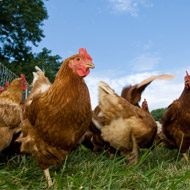
Welsh government takes action as ‘precautionary measure’
A prevention zone has come in to force across the whole of Wales to reduce the risk of avian influenza.
The move, announced by rural affairs secretary Lesley Griffiths, comes after three separate findings of highly pathogenic influenza H5N6 in wild birds in England. The findings led Defra to extend an avian flu prevention zone to the whole of England.
The latest veterinary risk assessment for England and Wales shows that the risk level for disease in wild birds has increased from Medium to High. Ms Griffiths said that although there are no findings of the disease in Wales, the prevention zone has been introduced as a 'precautionary measure'.
“As a precautionary measure, in response to the increased risk level, and to mitigate the risk of infection, I am declaring an All Wales Avian Influenza Prevention Zone,” she said. “Although we have had, as yet, no findings of Avian Influenza in 2018, I consider this Prevention Zone and the requirement for enhanced biosecurity to be proportionate to the risk level faced in Wales.
"It is essential we take steps to protect our poultry industry, international trade and the wider economy in Wales.”
Chief veterinary officer for Wales Christianne Glossop added that all bird keepers in Wales will need to comply with the requirements of the Avian Influenza Prevention Zone.
“Keepers must remain vigilant for signs of disease and practice the very highest levels of biosecurity,” she said.
“I strongly encourage all poultry keepers, even those with fewer than 50 birds, to provide their details to the Poultry Register. This will ensure they can be contacted immediately, via email or text update, in an avian disease outbreak, enabling them to protect their flock at the earliest opportunity and minimise the spread of infection.”
Avian influenza is a notifiable disease and any suspicion should be reported immediately to the Animal and Plant Health Agency.



 The latest
The latest